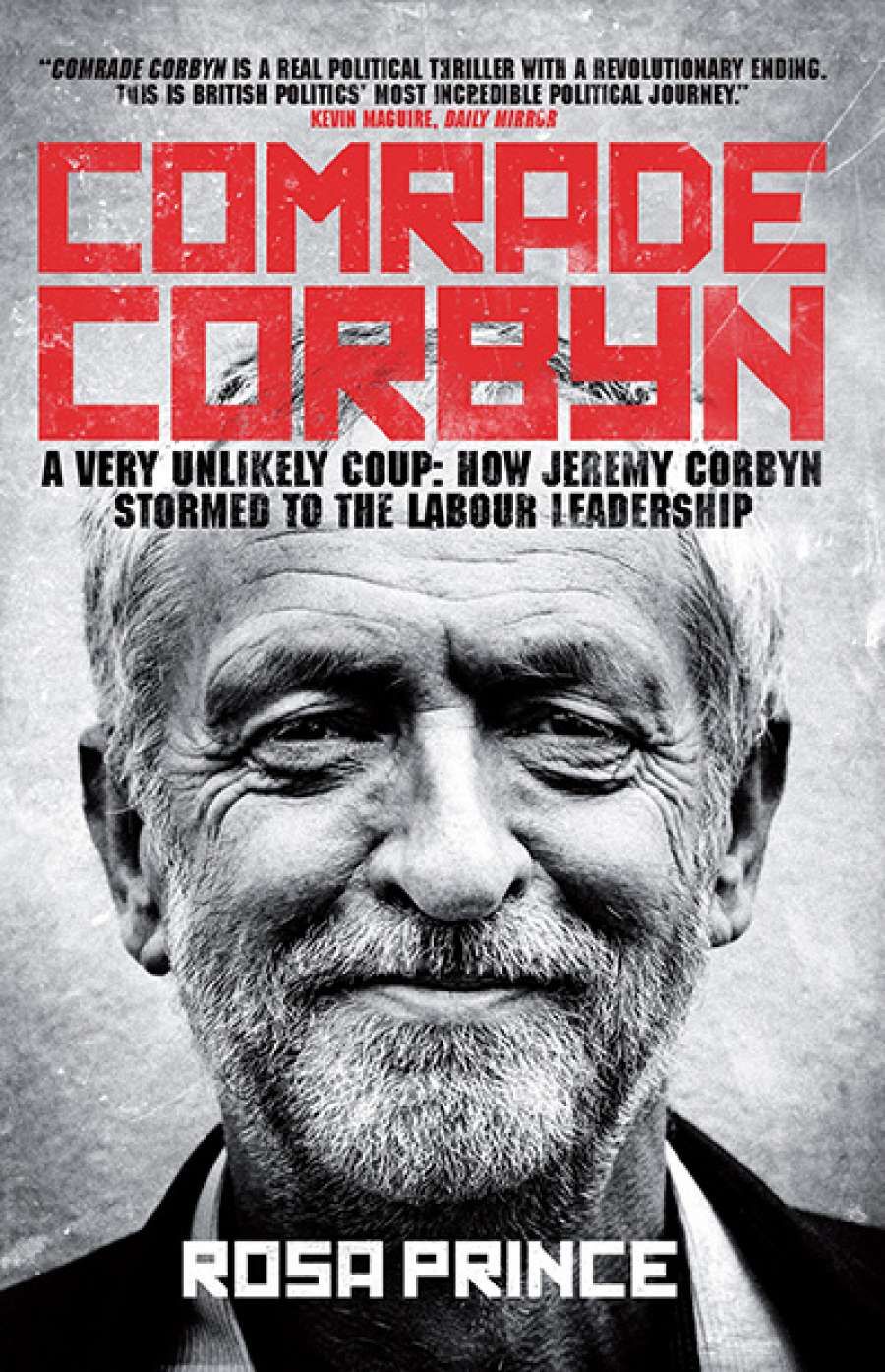
- Free Article: No
- Contents Category: Politics
- Custom Article Title: Simon Tormey reviews 'Comrade Corbyn' by Rosa Prince
- Custom Highlight Text:
In an extraordinary year for British politics the gloriously unexpected triumph of Jeremy Corbyn in the Labour Party’s leadership election in September 2015 probably ranks ...
- Book 1 Title: Comrade Corbyn
- Book 1 Biblio: Biteback Publishing, $39.99 hb, 384 pp, 9781849549967
Rosa Prince has done an admirable job here of trying to put together at least some of the parts of the puzzle taking a two-pronged approach to give the narrative some depth: part biography to give us a sense of the man himself, and part a (usefully) breathless retelling of the key events around his election to leader. The latter part is admittedly more engaging than the former; Corbyn’s past is unexceptional and rather dull. He moved about a bit as a child of conventionally middle-class parents, didn’t do very well at school, tried his hand at a few jobs, and ended up going into politics.
What is of more interest is that, notwithstanding his cheery demeanour and homespun radicalism, Corbyn has managed to work his way through three marriages to women who evidently shared his political convictions, but who seem to have concluded (the details are sparse) that they themselves weren’t as high a priority as his political allegiances. Given the thrust of the narrative this comes as little surprise. What strikes one here is Corbyn’s single-minded attachment to his causes: the injustice of US foreign policy; the lamentable legacy of colonialism; the necessity for state control over the ‘commanding heights of the economy’. All quite predictable for those familiar with the background; but what comes across is someone who is so certain of the justice of the causes he espouses that dialogue is shut down – to the detriment of personal as well as professional relationships. Corbyn is someone for whom politics is all-consuming. It is also a black-and-white matter: one is either on the side of the angels, or one is not. There can be no compromises, no half measures, no shades of grey.
 President Barack Obama meets with Jeremy Corbyn, Leader of the Labour Party and Leader of the Opposition, at Royal Horticultural Halls in April 2016 (Official White House Photo by Pete Souza via Wikimedia Commons)
President Barack Obama meets with Jeremy Corbyn, Leader of the Labour Party and Leader of the Opposition, at Royal Horticultural Halls in April 2016 (Official White House Photo by Pete Souza via Wikimedia Commons)
As becomes clear in the latter half of the book, it is this quality that seems to be attractive for a certain breed of citizen fed up with the Machiavellian scheming of parliamentary politics. Too many false smiles and perfect teeth, too little ‘plain speaking’, honesty, integrity. Corbyn’s near-saintly attachment to his causes seems fresh and invigorating to many. While Corbyn is not a charismatic figure nor one possessing the stage craft of a Trump or Blair, he does possess authenticity and conviction. He really does believe what he says. How do we know? Because as Prince relates, he has been saying exactly the same things over and over again since he set out in politics in the 1980s. The world may evolve and change in important ways, but Corbyn’s stance does not.
This unyielding quality is Corbyn’s chief strength as a political figure, but it is also his chief weakness as a leader of a major parliamentary party where compromise, coalition building, and dialogue with a plurality of positions are prerequisites for success. Notwithstanding, for example, Margaret Thatcher’s deeply held convictions, she was very conscious of the need to build bridges, make compromises, appease the parts of the Conservative Party that might not necessarily agree with her – as Charles Moore’s recent biography illustrates. The paradox of Corbyn is the more successful he is with those parts of the population ready for his anti-austerity line, the less effective and disciplined the party itself becomes, and in turn the less it looks like a party of governance as opposed to a party of protest – or indeed a social movement.
 Jeremy Corbyn speaking at a political rally during the Labour leadership election, in Matlock, Derbyshire (photograph by Tsering Lhamo, Wikimedia Commons)
Jeremy Corbyn speaking at a political rally during the Labour leadership election, in Matlock, Derbyshire (photograph by Tsering Lhamo, Wikimedia Commons)
On the other hand, these are undeniably strange days as far as politics in the advanced democracies is concerned. What is unfortunately absent from the text is an analysis of the wider context in which Corbyn’s rise took place. Prince does mention his productive use of social media, which offers one clue. However, little attention is given to the rise of left populism in Europe and the United States, which might in turn help us to understand why a figure such as Corbyn is gaining traction with swathes of the electorate – as of course have Bernie Sanders, Beppe Grillo, Pablo Iglesias, and all the rest. Politics is part of it. There is a constituency for a break with neo-liberalism and a return to social democracy; but there is also a weariness with technocratic politics, bureaucratic politics – a politics driven by the needs and interests of distant élites, in turn making us hungry for authenticity, conviction, principle, even where, as with Corbyn, it is expressed in an unblushingly anachronistic idiom. Whatever the case, the mix of nostalgia for a kinder age, social media, and ‘outsider’ street cred is becoming a key motif of the new politics as this episode reveals. Corbyn-esque ‘coups’ and ‘shocks’ are going to be the new normal.


Comments powered by CComment